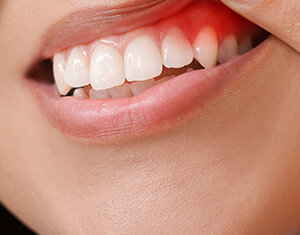Blog
12 Natural Home Remedies To Get Relief From Sensitive Teeth
Oral Care

When you consume your favourite ice cream, a cold beverage, or hot coffee, do you get a stinging discomfort in your teeth? If you are the one who ran through this discomfort in the past few days, this could indicate that your teeth are more sensitive than those of most other people. It is a severe dental condition known as tooth sensitivity, characterised by persistent irritation that interferes with breathing, eating, and drinking. It is a heightened reaction to outside sensory inputs that is typically absent from teeth in better health.
Let’s discuss 12 easy home remedies for tooth sensitivity that will relieve your tooth pain.
12 Natural Tooth Sensitivity Remedies
-
Green Tea
It has antioxidants and anti-inflammatory effects. So, to get relief from tooth sensitivity, rinse your mouth with unsweetened green tea two times a day to reduce the inflammation and strengthen your teeth.
-
Sesame Oil
How to treat sensitive teeth? Oil pulling is an alternative medicine protocol as a traditional remedy for gums and teeth strengthening. It comprises moving around edible oil in the mouth to improve oral cleanliness. Sesame oil can be used in oil-pulling therapy.
You should take a tablespoon of this oil, sip it, and then suck it between the teeth for about 5 mins. The sesame oil looks creamy, white, and quite fluid. Don't consume oil which contains toxins and bacteria. This therapy is done on an empty stomach in the morning and one should brush their teeth after that so as to get rid of excess oil.
-
Garlic
You can get relief by slicing some garlic and applying it immediately to the troubled tooth. Allicin, found in garlic, has antibacterial and analgesic properties. A clove of garlic, a few drops of water, and ½ teaspoon of salt can be combined to produce a paste if you'd rather.
-
Saltwater Rinse
The use of warm saltwater rinse can alleviate irritation if your gum tissues are the source of the sensitivity. To reduce tissue sensitivity, salt water naturally draws out edema and inflammation. Pour 8 ounces of somewhat warm water into a glass and sprinkle with about 1 teaspoon of table salt.
Rinse a few times a day until you've gone through the entire glass once it's completely diluted. This procedure can be repeated as needed during the day.
-
Honey and Warm Water
Honey has antimicrobial properties that will hasten the healing of your mouth. To lessen discomfort brought on by sensitivity, rinse your mouth with warm water mixed with honey.
-
Coconut oil pulling
Research has proved that brushing your teeth with coconut oil for around ten to twenty minutes a day can dramatically lower the harmful bacteria in your mouth and help ease tooth sensitivity.
Additionally, this can stop gingivitis, decaying teeth, and foul breath.
-
Turmeric
Inflammation and edema are frequently linked to tooth pain. Luckily, turmeric has anti-inflammatory properties by nature. When it comes to a home cure for tooth sensitivity, turmeric has a triple-acting edge because it contains other components that have antibacterial and analgesic properties.
-
Go for Sensitive Toothpaste
Using sensitive toothpaste can strengthen and shield your tooth enamel. Additionally, there are less components in it that can aggravate your teeth's exposed nerves. For example, brushing your teeth with Dabur Meswak helps in keeping gums healthy and teeth strong from sensitivity.
-
Mustard twigs
The Mustard tree, also known as the toothbrush tree or miswaak, possesses various beneficial components like essential oils, alkaloids, tannins, terpenoids, and flavonoids. These natural elements may offer antimicrobial properties, making them a traditional aid for oral hygiene.
Miswaak, crafted from the tree's roots and stems, serves as a chewing stick and is considered a home remedy for sensitive teeth. It's believed to help control microbial growth, potentially alleviating sensitivity issues. Incorporating miswaak into your oral care routine could be a practical approach to managing dental discomfort, thanks to its natural properties.
-
Capsaicin
This is another teeth sensitivity solution. Chilli peppers are a natural source of capsaicin. It may also affect the way in which pain signals are transmitted to your brain by nerve receptors. Unfortunately, it also gives you a burning feeling in your mouth. Nonetheless, it wouldn't hurt to test capsaicin if you enjoy spicy food and aren't sensitive to heat.
-
Clove Oil
It possesses analgesic and anti-inflammatory qualities. So, take a few drops of clove oil on a cotton ball for optimal effects. After that, keep applying it to the afflicted area until the pain stops. Alternatively, you can chew the clove for 20 to 30 minutes or until the ache stops.
-
Use a Soft Toothbrush
If you have sensitive teeth or gums, use a toothbrush with mild bristles to prevent aggravating your sensitivity. The reason is overly vigorous brushing might harm your oral tissues and cause your gums to recede.
The Bottom Line
While sensitivity in teeth home remedies may temporarily relieve your tooth pain, they won't address the underlying cause of the problem. This means, for best results, make an appointment with your dentist if the sensitivity in your teeth lasts longer than a few weeks. In addition to recommending the best course of action to ease your pain, they are able to determine the reason for your tooth sensitivity.
FAQs
-
What are sensitive teeth?
When gums recede and expose the dentine (the layer beneath tooth enamel), tooth discomfort results. Thus, every time you eat or drink something, your dentine aches sharply, making your teeth sensitive.
-
Can coconut oil help with tooth sensitivity?
Coconut oil eliminates bacteria and toxins from the gum surface, breaks down dental plaque, and prevents the growth of microorganisms in the mouth.
-
What are some benefits of keeping the tongue clean?
Regular cleaning tongue benefits include fresher breath, improved taste, less irritation, and reduced bacteria, lowering the risk of tooth decay and oral infections.
This will lessen dental sensitivity by encouraging healthier gums and teeth. Over time, it can also make your teeth whiter and more radiant.
-
What oil kills tooth pain?
Eugenol is a particular kind of chemical component that is abundant in clove oil. Eugenol, which makes up around 90% of clove oil, is very beneficial in toothache situations. Because of its analgesic qualities, this plant-derived substance may be able to relieve toothache discomfort.























